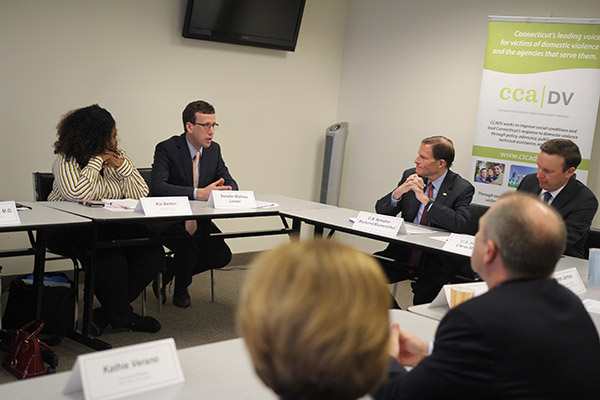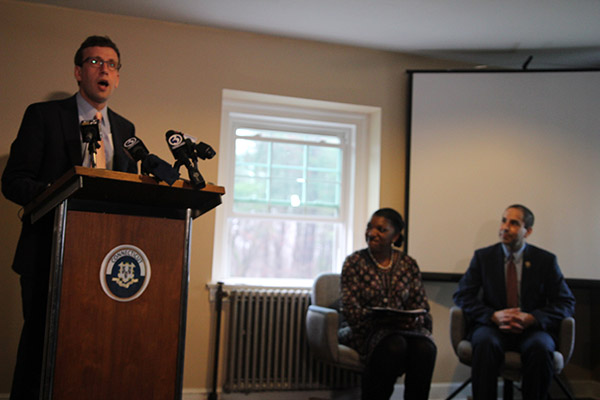Sen. Cohen Applauds Appropriations Committee Advancement
of Public Option for Health Insurance Legislation
HARTFORD, CT – Today, the Appropriations Committee advanced two pieces of legislation to create a public option for health care by a 29-19 tally. A public option will provide relief for Connecticut families and small businesses who are struggling to afford essential health insurance due to the rising cost of care. The two public option bills will advance to the State House of Representatives and State Senate floor for further debate and action.
State Senator Christine Cohen (D-Guilford) owns a small business in Madison and has been a supporter of a public option for health insurance for Connecticut small businesses. She said small business owners and their employees need relief from rising health insurance costs.
“As a small business owner, I know the burden caused by these high health insurance costs,” said Sen. Cohen. “These exorbitant fees have some facing a dilemma where they are choosing between offering their hard-working employees health insurance, or focusing on their bottom line to keep their doors open. High deductible plans have others deciding to forego either a trip to the doctor, for which they would have to pay out of pocket, or deciding to go completely uninsured. A public option will provide small business owners with a quality, affordable plan they can offer their employees, thus continuing to make our state an attractive location for small businesses.”
The Insurance and Real Estate co-chairs, State Senator Matt Lesser (D-Middletown) and State Representative Sean Scanlon (D-Guilford), commended the committee for passing this legislation and said the time is now for a real public option for Connecticut.
Sen. Lesser, who is also on the Appropriations Committee, led debate on the need to pass the public option.
“Connecticut will lead – even as Donald Trump vows to strike down the Affordable Care Act in the courts,” said Sen. Lesser. “With healthcare costs out of control, Connecticut families and businesses need new options for healthcare. We need to make sure everyone has access to affordable, high quality healthcare choices. I am grateful for this vote of confidence by my colleagues.”
“Connecticut small businesses and individuals are getting crushed by the rising cost of health insurance and this bill will provide companies and hundreds of thousands of people with something they desperately need: an affordable, predictably priced insurance option,” said Rep. Scanlon. “I’m grateful to my colleagues on the Appropriations Committee for moving this bill forward and now it’s time for the full legislature to act so we can deliver real cost relief to the people of Connecticut.”
A public option is needed to provide Connecticut families, individuals and small businesses with an affordable choice for quality health insurance as costs continue to skyrocket and put life-saving care out of reach. Both public option bills will create competition in the health insurance marketplace and result in better prices for consumers.
The Connecticut State Medical Society (CSMS) and the state’s comptroller, Kevin Lembo, have given their support to public option legislation. According to the Office of Fiscal Analysis (OFA), the fiscal note of this legislation is $1.5 million in the 2020 fiscal year and $750,000 in the 2021 fiscal year. Comptroller Lembo and CSMS President Claudia Gruss, MD agree these pieces of legislation will positively impact the lives of many.
“I have been meeting with small businesses across the state and, everywhere I go, the message is the same: Small businesses are sick and tired of being unable to find or keep skilled workers, unable to compete with corporate benefit packages, facing double-digit increases in costs for overly complex and confusing health care coverage, unpredictable and unstable health care costs while they pay for nothing –high-deductible plans where employees never see $1 of benefit,” said Comptroller Lembo. “Today’s action by the Appropriations Committee moves us closer to allowing my office to offer more affordable benefits to businesses so they can attract quality employees and provide reliable and affordable health care.”
“CSMS applauds and supports the efforts of Senator Lesser and Representative Scanlon to push for concepts, such as those contained in House Bill 7267,” said President Gruss. “Both are continually working to provide access to affordable health insurance coverage through such ideas as, expanding the state employee health program and increasing options available to Connecticut residents through the State’s Health Insurance Exchange, AccessCT.”
Public Option Legislation/HB 7267/SB 134
The Small Business Option (2020)
Phase one of the public option
- Open the Partnership 2.0 Plan to all small businesses and non-profits (50 employees and under) so all employers can offer quality and affordable health care coverage to their employees
- Through its Partnership 2.0 plan, the state currently offers small group insurance to non-state public employees, where enrollees are able to enjoy the benefits of the state employee health plan
Plan design benefits:
- § Legislation will allow the State to administer several plan designs, enabling employers to find a plan with the right balance between cost and coverage for their employees
- § All plans will include the Health Enhancement Program (HEP), allowing enrollees to seek preventative care services at no additional cost. In addition, HEP enrollees are not responsible for a deductible
- § Because the State Employee Health Plan is so large, it has a stable risk pool with low administrative costs. This has allowed the State to seek minimal premium increases compared to other small group plan, and the plan for small businesses will benefit similarly from low administrative costs
The Individual Option (2021)
Phase two of the public option
- Establish ConnectHealth to offer high quality, low cost health insurance to individuals
- Through the Comptroller’s office, the State will contract with one or more private insurers to offer ConnectHealth to individuals as a high quality, affordable health plan
- ConnectHealth Plan Design Benefits:
- § Plans will be required to offer an extensive list of Essential Health Benefits and will meet specific standards outlined under the ACA
- § Subsidies may be available to reduce out of pocket costs for participants, based on their household income
- With the authority provided in HB 7267: An Act Concerning Public Options for Connecticut and the negotiating power of the Comptroller, the state will be able to maintain low out-of-pocket costs for consumers compared to other private plans
Looking Ahead (2021)
Phase three of the public option
- Studying long-term opportunities to make additional affordable options available for more Connecticut residents
- A multi-stakeholder Advisory Council will be formed to guide the development of the ConnectHealth option, and to consider ways to further improve affordability for all consumers
- The Comptroller’s office will coordinate with the Advisory Council and Office of Health Strategy to develop a strategy to request federal approval to use funds to provide additional subsidies for premiums and cost sharing
- Information on HB 7267 is from the Universal Health Care Foundation of Connecticut, the Comptroller’s Office, United State of Care and the Connecticut Citizen Action Group
The benefits of creating a public option for Connecticut small businesses:
- Encourages a competitive health insurance marketplace, protecting consumers from private insurers implementing steep and rapid price increases.
- Helps small businesses lower operating costs (less expensive fringe benefits).
- Improves the quality of health care small businesses in Connecticut can offer their employees.
- Make Connecticut small businesses more attractive and competitive to workers.
- Decreases the state’s healthcare costs for its own employees by increasing the buying power of its health plan.
Both pieces of public option legislation passed the Insurance and Real Estate Committee on March 19 by an 11-8 tally.


